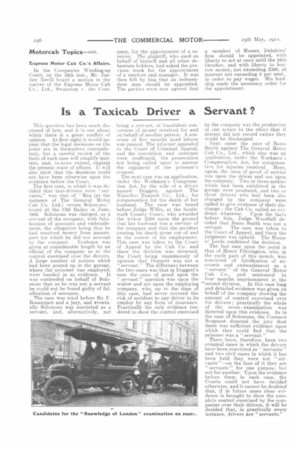Is a Taxicab Driver a Servant ?
Page 16

If you've noticed an error in this article please click here to report it so we can fix it.
This question has been much discussed of late, and it is one about which there is a great conflict of opinion. At first sight it would appear that the legal decisions on the point are in themselves contradictory, but a careful review of the facts of each case will simplify matters, and, to some extent, explain the present state of affairs. Jr will also show that the decisions could not have been otherwise upon the evidence before the Court.
The first case, in which it was decided that taxi-drivers were " servants," was that of " Rex (at the instance of The General Motor Cab Co. Ltd.) versus Solornans," heard at the Old Bailey in June, 1909. Solomons was charged, as a servant of the company, with falsification of accounts and embezzlement, the allegation being that he had received money from passengers tor which he did not account to the company. Evidence was given at considerable length by an official of the company as to the control exercised over the drivers. A large number of notices which had been posted up in the garage, where the prisoner -xas employed.
were handed in as evidence. It was contended on behalf of Solomons that as he was not a servant he could not be found guilty of falsifica,tion of accounts.
The case was tried before Sir F. Bosanquet and a jury, and eventually Solomons was convicted as a servant, and, alternatively, not being a servant, of fraudulent conversion of money received for and on behalf of another person. A sentence of five months hard labour was passed. The priscner appealed to the Court of Criminal Appeal, and the conviction and sentence were confirmed, the prosecution not being called upon to answer the argument of the prisoner's counsel.
The next case was an application, +Ander the Workmen's Compensation Act, by the wife of a driver named Doggett, against The Waterloo Taxicab Co., Ltd., for compensation for the death of her husband. The case was heard before Judge Willis, at the Southwark County Court, who awarded the widow £250 upon the ground that her husband was a servant of the company and that the accident causing his death arose out of and in the course of his employment. This case was taken to the Court of Appeal by the Cab Co. and there the decision was reversed, the Court being unanimously of opinion that Doggett was not a "servant." The difference between the two cases was that in Doggett's case the onus of proof upon the " servant " question was upon the widow and not upon the employing company, who, UP to the time of this case, had never covered the risk of accident to any driver in its employ by any form of insurance. Practically the only evidence tendered to show the control exercised by the company was the production of one notice to the effect that if drivers did not record extras they would be discharged.
Next came the case of Bates Smith against The General Motor Cab Co., Ltd., which also was an application, under the Workmen's Compensation Act, for compensation for injuries received. Here, again, the onus of proof of service was upon the driver and not upon the company. Two or three notices which had been exhibited in the garage were produced, and two or three drivers who had been discharged by the company were called to give evidence of their discharge; the Cab Co. called no evidence whatever. Upon the facts before him, Judge Woodfall decided that Bates Smith was not a servant. The cast, was taken to the Court of Appeal, and there the judgment was upheld. The House of Lords confirmed the decision. The last case upon the point is that of Henry Ellerington, who, in the early part. of this month, was convicted of falsification of accounts and embezzlement as a " servant " of the General Motor Cab Co., and sentenced to four months imprisonment in the —second division. In this case long and detailed evidence was given on behalf of the company showing the amount of control exercised over the drivers ; practically the whole of the cross examination was directed upon this evidence. As in the case of Solomons, the Common Sergeant directed the jury that there was sufficient evidence upon which they could find that the prisoner was a " servant."
There have, therefore, been two criminal cases in which the drivers have been convicted as " servants " and two civil cases in which it has been held they were not " servants "—on the face of it they are " servants " for one purpose UAt not for another. Upon the evidence before them in each case, the Courts could not have decided otherwise, and it cannot be doubted that, if in future cases clear evidence is brought to show the complete control exercised by the companies over their drivers, it will be decided that, in practically every instance, drivers are "servants."






















